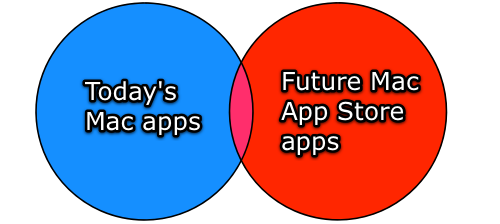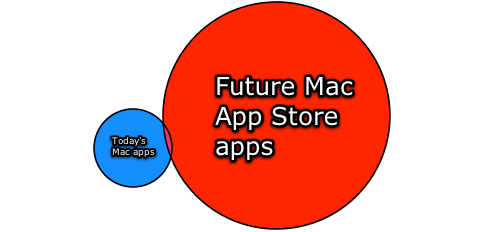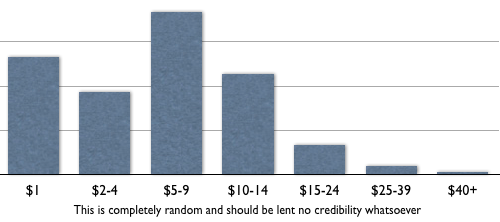The Mac App Store isn’t for today’s Mac developers
https://marco.org/2010/10/29/the-mac-app-store-isnt-for-todays-mac-developers
Apple’s recently announced App Store for the Mac is a Really Big Deal™, for reasons I’ll get to in a moment. But a lot of existing Mac developers have pointed out major issues or unknowns that need to be addressed:
- Will App Store apps be required to be sold exclusively in the App Store? (My guess: No.)
- If so, how different would another “edition” of the app need to be for Apple to consider it a separate app and permissible to be sold elsewhere? (The vagary of this is why I guessed “No” to exclusivity.)
- If not, will a publisher be allowed to charge a different prices in other places? Could they, for instance, charge 20% less on their websites so they’d attract savvy buyers to get it directly and still make more money since Apple’s taking 30%? (My guess: Yes.)
- The prohibition on private API usage will keep a lot of popular Mac apps out of the Store. Are they serious about that? (My guess: Yes.)
- Will there be any good way for developers to get customer lists from App Store buyers? (My guess: No.)
- Will there be any good ways to “crossgrade” buyers from the retail edition of an app to the App Store edition without making them pay again in full? (My guess: No.)
- Will time-limited trials be permitted? (My guess: No.)
- Will upgrade pricing for new versions be implemented? (My guess: No.)
- Will refunds be any easier? (My guess: No.)
Since almost all of these are likely to be inconvenient at best (and often dealbreakers) for current Mac developers, it’s easy to miss the likely intention and likely effects of this.
The likely intention
I’m guessing this is what Apple has in mind. If not, this is at least what I think is likely to happen:

Actually, the scale’s off.
This is the much more likely outcome:

…for a few reasons.
Apps as entertainment
In high school, my friends and I went to the movie theater almost every weekend, usually not even knowing what was playing, and decided how to spend our $5-10 when we got there. We knew it would buy us a few hours of entertainment, and we knew that most of the movies would be mediocre, a few would be horrible, and a few would be great. The predictability and low cost of these outings gave us a reliable way to be entertained on a regular basis.
One of the reasons the iOS App Store is so successful is that app-buying has become a form of casual, routine entertainment for iPhone and iPad owners. We gladly go and browse the App Store even when we don’t “need” anything at the moment, with the intention of going and spending a few bucks on whatever’s new that looks good.
This requires a few conditions to be ideal, all of which are true on the iOS App Store:
- There must be a large number of new apps being regularly added, and they must be easy to find and browse.
- Apps must be low-risk. That means:
- Inexpensive.
- Trustworthy that they won’t do anything creepy or destructive.
- Easy and quick to purchase and install.
- Easy and quick to delete.
- Enough apps should be good that people will remember the good ones and forget the bad.
Today, on the Mac, almost none of these are true. And if the Mac App Store is only populated by a subset of today’s Mac software, a few key points (such as “Inexpensive”) still won’t be true. This is why I believe that the Mac App Store will be dominated by (and become known for) apps that don’t exist on the Mac today.
Appeal to iOS developers
Much of what made the App Store so compelling to developers will begin to apply to Mac software with the Mac App Store:
- Most Mac owners will be encouraged from prominent places on their Macs to buy apps. The potential audience is huge, and will be much easier to reach.
- Payment processing will be much simpler.
- Software websites won’t need nearly as much functionality.
- Two of the most common support issues for desktop software vendors — installation support and serial-number issues — will almost completely disappear.
So I expect a lot of iOS developers to start making Mac apps, especially individuals and very small teams.
And these are the average selling prices I expect for non-free software:

In other words, a lot like iPad-app pricing, but shifted slightly higher. And even considering the lower prices than current Mac software, and Apple’s 30% cut, the value in exposure will overcome those for most good apps, and developers will be able to make a lot of money.
What about today’s Mac developers?
They’ll be fine.
Today’s market for Mac software isn’t going anywhere. People will continue to find (or not find) traditional apps in the traditional ways, and will continue to buy (or not buy) them in retail stores and from the vendors’ websites at about the same rates. In fact, as the Mac’s marketshare grows, this market will continue to grow with it.
But a huge new market is about to open next door. And yes, it’ll probably be dominated by Angry Birds and other inexpensive, often trivial apps. When this happens, a lot of traditional Mac developers are going to look down on it. But those with a bit of free time to develop their own inexpensive, often trivial apps might have a different viewpoint entirely when they see their sales numbers.
As both a Mac user and an iOS developer, I’m incredibly excited for the potential of this market.